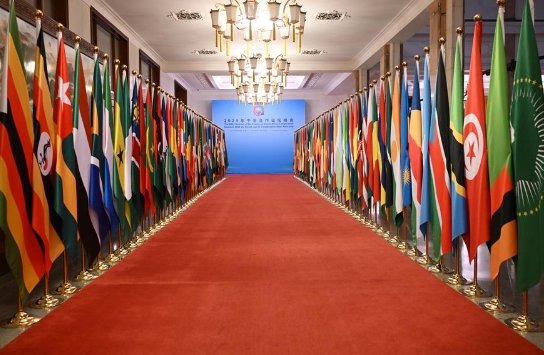Experts, officials call for stronger China-Africa cooperation via Global Development Initiative

This photo taken on Sept. 5, 2024 shows an interior view of the Great Hall of the People before the opening of the 2024 Summit of the Forum on China-Africa Cooperation (FOCAC) in Beijing, capital of China. (Xinhua/Jin Liangkuai)
"The Global Development Initiative builds on the foundations of the SDGs to chart a path towards the realization of a global community," said Mohamed Belhocine, the AU Commissioner for Education, Science, Technology and Innovation.
Experts and policymakers from various United Nations (UN) agencies, the African Union (AU) and African countries stressed the need to further bolster China-Africa cooperation across various sustainable development areas while attending a recent dialogue on the Global Development Initiative (GDI) here.
Addressing the gathering, Mohamed Belhocine, the AU Commissioner for Education, Science, Technology and Innovation, said China-Africa ties have evolved into "an outstanding and mutually beneficial partnership."
Describing China-Africa cooperation as "a bright example of South-South cooperation that addresses and harnesses global challenges and opportunities in several priority areas," the AU commissioner said the China-proposed GDI has the capacity to further strengthen the ever-growing China-Africa relationship and broaden South-South cooperation.
"The Sustainable Development Goals (SDGs) and the Agenda 2063 (the AU's 50-year continental development blueprint) both provide strategic frameworks for tackling issues confronting Africa and the world at large. In the same vein, the Global Development Initiative builds on the foundations of the SDGs to chart a path towards the realization of a global community," said Belhocine.
Belhocine further said China-Africa cooperation has achieved mutually beneficial development outcomes over the years. "The Forum on China-Africa Cooperation is a vivid testament to the benefits of a partnership which covers science and technology, peace and security, climate change, education, agriculture, and information and communications technology, among many other sectors."
Participants attending the high-level dialogue emphasized the critical need to promote synergy in development plans and strategies to enhance broader China-Africa cooperation as the two sides strive to realize the vision of the GDI.
Zhao Fengtao, vice chairman of the China International Development Cooperation Agency, highlighted China's readiness to work with Africa to fully implement the GDI and continue to strengthen China-Africa development cooperation, ultimately contributing to advancing the modernization and building of an all-weather China-Africa community with a shared future for the new era.
"The GDI calls for staying committed to development as a priority, staying committed to a people-centered approach and staying committed to benefits for all," Zhao said.
He also stressed China's strong commitment to supporting Africa's economic integration and modernization, improving the well-being of the African people and facilitating the implementation of the sustainable development agenda.
Teshale Berecha, Ethiopia's state minister of labor and skills, said the "remarkable" China-Africa cooperation, which exemplifies the spirit of South-South cooperation, is a vivid manifestation of the two sides' shared commitment to mutual growth, sustainable development and empowerment of the two peoples.
Highlighting some of the significant achievements of China's cooperation with Ethiopia in particular and the wider African continent in general, the state minister said China has been a major partner for Ethiopia and beyond, particularly through its Belt and Road Initiative and other major development initiatives.
"Our collaboration has yielded significant advancements in the area of science and technology too," he said. "The establishment of joint research centers and technology transfer initiatives has enabled us to harness our collective expertise and address pressing challenges."
Editor:伏娅敏
